|
|
|
Sort Order |
|
|
|
Items / Page
|
|
|
|
|
|
|
| Srl | Item |
| 1 |
ID:
187352
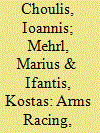

|
|
|
|
|
| Summary/Abstract |
Arms races are linked in the public conscience to potential violence. Following gas discoveries in eastern Mediterranean, Greece and Turkey nearly came to blows in August 2020 and both states have enacted military expansion plans, further risking escalation. We present a novel approach to study the effect of military build-ups on dispute intensity, using monthly data on Turkish incursions into Greek-claimed airspace. Because airspace claims feature strongly in the dispute, these contestations represent an appropriate measure of the intensity with which Turkey pursues the conflict. Theoretically, we suggest that bilateral factors drive this intensity. We argue that increased Greek military capabilities deter incursions whereas increased Turkish military capabilities fuel them. Results from time-series models support the second expectation. Consequently, the study provides a novel methodological approach to studying interstate conflict intensity and shines new light on escalation dynamics in the Greek-Turkish dispute.
|
|
|
|
|
|
|
|
|
|
|
|
|
|
|
|
| 2 |
ID:
182564
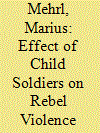

|
|
|
|
|
| Summary/Abstract |
Existing work describes child soldiers as very violent towards civilians. Challenging this, I posit that children’s effect on group behaviour is conditioned by rebels’ civilian support. Because they have weak pre-existing norms, children are both prone to normalize violence and susceptible to rebel efforts to control their use of violence. They should thus closely follow group rules in their behaviour towards civilians, implying a moderating effect of these rules. I expect that child soldiering increases civilian victimization only for groups who lack incentives to show restraint towards civilians because they receive no support from them. Empirical tests support this expectation.
|
|
|
|
|
|
|
|
|
|
|
|
|
|
|
|
| 3 |
ID:
185258
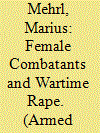

|
|
|
|
|
| Summary/Abstract |
Whereas existing research posits that the presence of female fighters in armed groups decreases their propensity for wartime rape, one recent study tests this claim quantitatively and is unable to detect a statistically significant effect. This leads the author to conclude that female combatants do not decrease rape. Using that study’s original data, this article reexamines the evidence for the relationship between female rebel combatants and wartime sexual violence. Replications of the original models suggest that they make strong functional form assumptions regarding numerous independent variables and time dependence and that relaxing them results in substantively different findings. Namely, women’s participation in armed groups decreases groups’ use of wartime rape. In support of Loken’s organizational theory of rape, results also suggest that this effect is moderated by group norms. These findings contribute to the literature on female participation in rebel groups and beyond.
|
|
|
|
|
|
|
|
|
|
|
|
|
|
|
|
| 4 |
ID:
188705
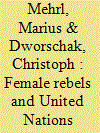

|
|
|
|
|
| Summary/Abstract |
How does the presence of female rebel combatants during conflict influence the likelihood of United Nations post-conflict peacekeeping deployment? While past literature on peacekeeping emphasizes the role of conflict attributes and security council interests, only few studies investigate the importance of belligerent characteristics. We argue that, because dominant gender stereotypes paint women as peaceful, female rebel combatants lead domestic and international audiences to perceive conflicts in which they fight as more severe. Given that recent UN resolutions and mission mandates align with these stereotypes, this in turn, causes the UN to intervene and deploy peacekeepers. Multivariate regression models drawing on a global sample of UN post-conflict missions provide empirical support for our hypothesis. Our findings add to the growing body of literature emphasizing the role of women in combat roles, and contribute to the discussion on the UN’s Women, Peace, and Security agenda.
|
|
|
|
|
|
|
|
|
|
|
|
|
|
|
|
| 5 |
ID:
183149
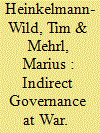

|
|
|
|
|
| Summary/Abstract |
Instead of attacking their adversaries directly, states often do so indirectly by supporting rebel groups. While these support relationships vary considerably, existing research lacks a comprehensive account thereof. To explain states’ choice of support, we suggest differentiating between two modes of support relationships according to the control opportunities they offer states over rebels: while delegation enables “hands-on” control, “hands-off” orchestration allows for plausible deniability and does not harm rebels’ local legitimacy. We argue that sponsors prefer orchestration when “hands-on” control can be substituted by goal alignment or competition; and they prefer delegation when the conflict is highly salient. Tests using global data for the period 1975-2009 support the first two expectations. Surprisingly, states’ capabilities also render “hands-off” orchestration more likely. The paper advances the understanding of external rebel support by transferring insights from indirect governance theory to the study of indirect wars and putting it to statistical test.
|
|
|
|
|
|
|
|
|
|
|
|
|
|
|
|
| 6 |
ID:
174726


|
|
|
|
|
| Summary/Abstract |
Although often conjectured, there is a lack of empirical evidence whether international inflows of military technology render intrastate conflicts more violent. We address this question and argue that expansions in governments’ ability to fight aggravate the lethality of intrastate war. However, we expect this effect to be conditioned by rebels’ military endowments and their choice of tactics. Where rebels are weak, they avoid open combat, and additional governmental arms imports have no effect on the number of casualties. In contrast, governmental arms imports cause human losses to multiply when rebels have achieved military parity or superiority and, as a consequence, use conventional combat tactics. This hypothesis is tested on the number of battle-related deaths in intrastate conflict, 1989 to 2011, using, for the first time, data on governmental imports of both major conventional weapons and small arms. Results support our propositions and are robust to instrumenting for imports of both types of weapons.
|
|
|
|
|
|
|
|
|
|
|
|
|
|
|
|
|
|
|
|
|